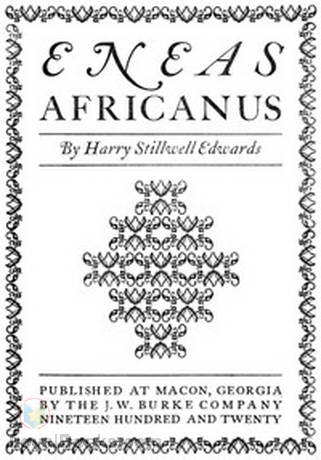Eneas Africanus By: Harry Stillwell Edwards (1855-1938) |
|---|

Eneas Africanus by Harry Stillwell Edwards is a remarkable piece of historical fiction that offers readers a gripping portrayal of the African-American experience during the Reconstruction era. Set in the late 19th century South, this book delves into complex themes of race, identity, and the struggles faced by freed slaves in their quest for equality.
One of the novel's greatest strengths is its rich character development. The protagonist, Eneas Africanus, is a captivating figure with a compelling backstory that constantly drives the narrative forward. Born into slavery and eventually freed, Eneas embarks on a personal journey in search of his true identity and purpose. Edwards masterfully captures Eneas's internal conflict as he grapples with racial prejudice and societal limitations while striving to forge his own path.
Edwards's vivid descriptions bring the post-Civil War South to life, portraying the palpable tension and hostility that defined the era. Through his prose, the author exposes the harsh realities faced by African-Americans, shedding light on issues such as systemic discrimination, violence, and the deeply entrenched prejudices that plagued society. By intertwining historical events and real-life figures with fictional ones, Edwards creates an authentic sense of time and place, making the reader fully immersed in the narrative.
The book's exploration of racial identity is particularly poignant. Eneas Africanus presents a thought-provoking examination of the complexities surrounding one's heritage and the struggle to reconcile different aspects of one's cultural background. As Eneas encounters various characters who represent different views on racial assimilation, readers are prompted to reflect on the multifaceted nature of identity and the choices individuals make in order to navigate societal expectations.
Moreover, the seamless incorporation of dialogues and dialects adds depth and authenticity to the story. It showcases the nuances of language and accent, effectively capturing the cultural diversity of the time. Edwards's commitment to historical accuracy is evident throughout, as he expertly integrates relevant historical events into the narrative without overpowering the central story.
While Eneas Africanus is undoubtedly a masterful work, it can be demanding for readers who may prefer lighter reading, as it delves into weighty topics and emotions. However, the rewards of engaging with this novel far outweigh any initial difficulty, as it offers a profound insight into a crucial period in American history.
In conclusion, Eneas Africanus by Harry Stillwell Edwards is an extraordinary historical fiction novel that delves deep into the African-American experience during a tumultuous period. With its intricate character development, authentic portrayal of race and identity, and meticulous historical detail, the book leaves a lasting impact on readers. Edwards's storytelling prowess combined with his exploration of important themes make Eneas Africanus a highly recommended read for anyone interested in thought-provoking literature that sheds light on the complexities of the human experience. ENEAS AFRICANUS By Harry Stillwell Edwards [Illustration] PUBLISHED AT MACON, GEORGIA BY THE J. W. BURKE COMPANY NINETEEN HUNDRED AND TWENTY Copyright, 1920 The J. W. Burke Company Author's Preface Dear to the hearts of the Southerners, young and old, is the vanishing type conspicuous in Eneas of this record; and as in a sidelight herein are seen the Southerners themselves, kind of heart, tolerant and appreciative of the humor and pathos of the negro's life. Eneas would have been arrested in any country other than the South. In the South he could have traveled his life out as the guest of his "white folks." Is the story true? Everybody says it is. [Illustration] [Illustration] Eneas Africanus Extract from the Atlanta Constitution of October 12, 1872 WHO HAS THIS CUP? MAJOR GEORGE E. TOMMEY ADVERTISES FOR HIS SILVER CUP... Continue reading book >>
|
| eBook Downloads | |
|---|---|
|
ePUB eBook • iBooks for iPhone and iPad • Nook • Sony Reader |
Kindle eBook • Mobi file format for Kindle |
|
Read eBook • Load eBook in browser |
Text File eBook • Computers • Windows • Mac |
| Review this book |
|---|